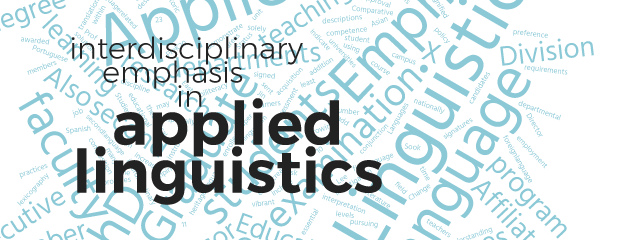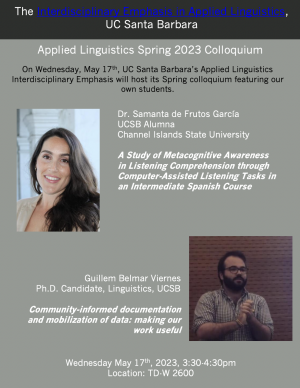Event Date:
Event Location:
- TBD
Event Price:
Free
- Colloquium
Wednesday May 17th, 2023, 3:30-4:30pm
Location: TBD
Dr. Samanta de Frutos García
A Study of Metacognitive Awareness in Listening Comprehension through Computer-Assisted Listening Tasks in an Intermediate Spanish Course
The present study examines the effects of implementing podcasts through computer-assisted Task-Based Language Teaching on participants’ metacognitive awareness of listening comprehension. Fifty-one intermediate second language learners of Spanish completed six listening tasks that led them through the metacognitive processes of L2 listening comprehension (planning and evaluation, directed attention, person knowledge, mental translation, and problem-solving). Students completed each task and then reflected on their listening processes. Participants completed a questionnaire that assessed their awareness and perceived use of listening strategies at the beginning and end points of the study. Additionally, responses from open-ended questions self-reflecting on their listening strategies were analyzed. The findings of this study reveal the potential of developing metacognitive processes and knowledge in L2 listening comprehension through listening tasks.
In this talk I focus on my work with Sa’an Savi ña Ñuu Xnuviko (Mixtepec Mixtec), a variety of Mixtec spoken in the municipality of Mixtepec (Oaxaca, Mexico) as well as in diaspora communities, such as in the Central Coast of California (see Reyes Basurto et al. 2021). I present three ways in which we have mobilized the data from the Sa’an Savi ña Ñuu Xnuviko documentation project to serve as tools for the community, rather than just data in linguistic analysis: a) establishing a Social Media presence and a Word of the Day Campaign (see Salazar et al. 2021); b) adapting documentation recordings as illustrated story books; and c) developing a multimodal informative resources about COVID-19 (see Salazar et al. forthcoming). This work goes beyond raising awareness and into the creation of resources that the community can use in their efforts to achieve language justice and access to services (see Ávila et al. 2022).


